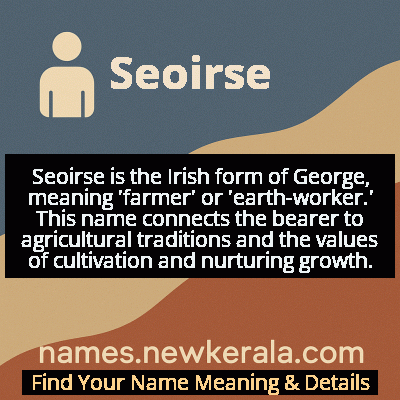Seoirse Name Meaning & Details
Origin, Popularity, Numerology Analysis & Name Meaning of Seoirse
Discover the origin, meaning, and cultural significance of the name SEOIRSE. Delve into its historical roots and explore the lasting impact it has had on communities and traditions.
Name
Seoirse
Gender
Male
Origin
Greek
Lucky Number
9
Meaning of the Name - Seoirse
Seoirse is the Irish form of George, meaning 'farmer' or 'earth-worker.' This name connects the bearer to agricultural traditions and the values of cultivation and nurturing growth.
Seoirse - Complete Numerology Analysis
Your Numerology Number
Based on Pythagorean Numerology System
Ruling Planet
Mars
Positive Nature
Generous, passionate, energetic, and humanitarian.
Negative Traits
Impulsive, impatient, moody, and can be overly emotional.
Lucky Colours
Red, maroon, scarlet.
Lucky Days
Tuesday.
Lucky Stones
Red coral, garnet.
Harmony Numbers
1, 2, 3, 6.
Best Suited Professions
Military, sports, philanthropy, leadership roles.
What People Like About You
Courage, energy, leadership, generosity.
Famous People Named Seoirse
Seoirse Bodley
Composer
One of Ireland's most important composers, known for blending Irish traditional music with contemporary classical techniques
Seoirse Ó Dochartaigh
Irish language activist
Prominent figure in the Irish language revival movement and Gaelic League
Seoirse Mac Thomáis
Historian and broadcaster
Renowned Dublin historian and popular television presenter on Irish history
Name Variations & International Equivalents
Click on blue names to explore their detailed meanings. Gray names with will be available soon.
Cultural & Historical Significance
The name's persistence in Irish society reflects the complex relationship between Irish identity and broader European influences. During periods of English domination, the use of Irish forms like Seoirse rather than the English George became a subtle act of cultural resistance and identity preservation. In modern Ireland, the name continues to represent this cultural duality—honoring both the international Christian tradition of Saint George while maintaining distinct Irish linguistic character. The name's agricultural origins also connect it to Ireland's historical rural economy and the importance of land and farming in Irish cultural memory.
Extended Personality Analysis
Individuals named Seoirse are often perceived as grounded, practical, and hardworking, reflecting the name's agricultural origins. They tend to be reliable and steadfast, with a strong connection to tradition and family values. Their farming etymology suggests a personality that is patient, nurturing, and capable of long-term planning, much like a farmer tending crops through seasons. Seoirses are typically seen as community-oriented individuals who value stability and gradual progress over sudden changes. They often possess a quiet strength and resilience, able to weather challenges with determination and practical wisdom.
This practical foundation is often complemented by a deep sense of loyalty and commitment to their principles. Seoirses are generally not impulsive decision-makers but rather considerate planners who weigh consequences carefully. Their connection to the earth metaphorically translates to being down-to-earth in personality—approachable, genuine, and without pretension. While they may be traditional in outlook, this doesn't necessarily mean resistance to change; rather, they prefer evolution to revolution, valuing the wisdom of experience while adapting to new circumstances. The combination of these traits often makes Seoirses trusted advisors, reliable friends, and steady leaders in their communities.
Modern Usage & Popularity
In contemporary Ireland, Seoirse maintains a steady though not overwhelmingly popular presence, representing a traditional choice for parents seeking to honor Irish heritage while using a recognizable name. The name has experienced a mild resurgence in recent years as part of the broader revival of Irish language names, particularly among families with strong cultural connections or those living in Gaeltacht areas. While it doesn't rank among the most popular names in Ireland today, it holds cultural significance beyond its numerical popularity. Modern Seoirses often go by 'George' in English-speaking contexts while maintaining the Irish spelling formally, reflecting the bilingual nature of contemporary Irish society. The name continues to be chosen by parents who value its historical roots and distinctive Irish character, serving as a meaningful connection to Irish linguistic heritage while remaining accessible in international contexts.
Symbolic & Spiritual Meanings
The name Seoirse symbolizes connection to the earth, cultivation, and sustainable growth, drawing from its fundamental meaning of 'farmer.' It represents the virtues of patience, hard work, and nurturing—qualities essential to agricultural life that translate metaphorically to personal development and community building. Symbolically, Seoirse embodies the idea of planting seeds for future harvests, whether in relationships, projects, or personal growth. The name carries connotations of stewardship and responsibility, suggesting someone who tends carefully to what has been entrusted to them. In a broader sense, it represents the bridge between ancient traditions and modern life, between Irish cultural identity and wider European influences. The symbolic meaning extends to being a cultivator not just of land, but of ideas, relationships, and cultural heritage, making it a name that speaks to both practical accomplishment and spiritual depth.

